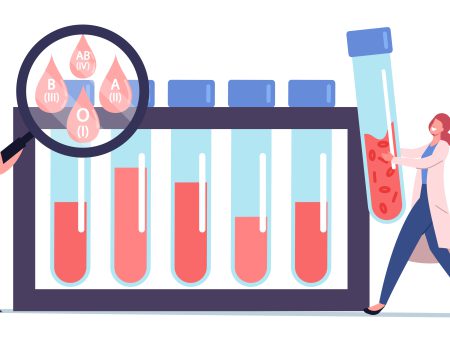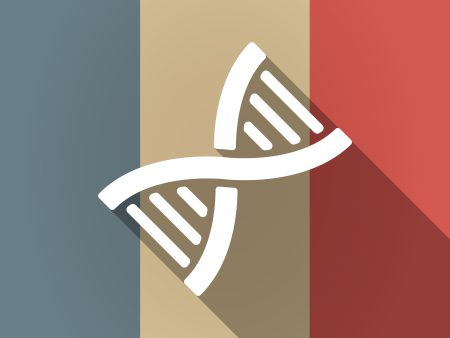Find the best DNA test in one click
Save time finding the best laboratory for your DNA test or creating your family tree with our complete files on the different players in the market.

From
50,00€
Highlights : DNA ancestry test | DNA paternity and prenatal test | DNA maternity test | DNA fraternity test | DNA health test | DNA test for dogs | Other DNA tests
From
99,90€
5€ discount
with code "MYDNATEST"
Highlights: DNA ancestry test | DNA paternity and prenatal test | DNA test for animals | Discreet delivery in France
From
89,00€
Highlights: DNA ancestry test | Family tree | Complete mobile application | Genealogy databases with millions of users
From
$99,00
Highlights: DNA ancestry test | DNA health test | Physiological traits report | Family tree
From
199,00€
Highlights: DNA ancestry test | DNA parentage test | Nobility and celebrity profiles | Delivery in France

Key factors in choosing a laboratory
Have you decided to order a DNA test? it is essential to consider the following characteristics in order to make an informed choice:
- Accuracy and reliability: Find out about test accuracy and result reliability. Choose laboratories with a high accuracy rate.
- Confidentiality and data security: Make sure the laboratory has strict protocols to protect your personal and genetic data.
- Reporting and interpretation of results: Check how the results are presented and whether they are easy to understand. Some laboratories offer consultations to help interpret results.
- Cost and value for money: Compare prices, but consider the quality and scope of the information provided.
- Customer service: Good customer service can be crucial, especially if you have questions or concerns about your test.
From
89,00€
Highlights: DNA ancestry test | Family tree | Complete mobile application | Genealogy databases with millions of users
From
$99,00
Highlights: DNA ancestry test | DNA health test | Physiological traits report | Family tree
From
£10,99
Highlights : Family tree | Unique historical archives | 2 billion documents
From
£5,00
Highlights : Family tree | Extensive British historical archives | DNA ancestry test | DNA paternity and maternity test
From
£4,95
Strengths: Family tree | Extensive British historical archives | Forums and active community
DNA test: Everything you need to know
Basics, differences & tests
How DNA works
The essential elements of DNA
DNA, or deoxyribonucleic acid, is the genetic material present in all living cells. It consists mainly of four chemical components: adenine (A), guanine (G), cytosine (C) and thymine (T). These nitrogenous bases pair in specific duos A-T and C-G to form a double helix structure. Base pairs are joined by hydrogen bonds, creating a solid framework that preserves DNA’s structural integrity.

DNA structure and duplication
DNA’s unique double-helix shape not only provides a robust defense against damage, but also facilitates its faithful reproduction during the cellular process known as mitosis. During this phenomenon, the two DNA chains break off along the entire length of the double helix, as the hydrogen bonds between each base pair are broken. Each chain is then used as a template to synthesize a new complementary strand according to the A-T and C-G base pairing principle, ensuring that each new cell receives a precise duplicate of the original genetic material.
DNA types
Mitochondrial DNA
Mitochondrial DNA, inherited exclusively from the mother, is distinguished by its unique location within the mitochondria – the cell’s energy factories. It consists of a small circular genome distinct from the rest of our genetic material and plays a crucial role in cellular energy metabolism. What’s more, mitochondrial DNA can provide valuable data for human genetic research and medicine, as it mutates at a much faster rate than nuclear DNA.
Autosomal DNA
In contrast to mitochondrial DNA is autosomal DNA, which resides in the 22 pairs of non-sexual chromosomes or “autosomes”. This DNA is transmitted in equal parts from both parents, making it a vast portion of the individual’s genetic heritage. Examination of this DNA makes it possible to establish genealogical links with a high degree of reliability over several generations, and to identify ancestry. Its less frequent mutation than mitochondrial DNA makes it a valuable tool for evolutionary studies.
Y-DNA
Y-DNA, found exclusively in males, is transmitted from father to son and is located on the Y chromosome, one of the sex chromosomes. This type of DNA is crucial for studying paternal lineages, as it changes very little over the generations. Y-DNA is often used in genealogy to trace paternal ancestry and can provide unique information about the family history and migrations of paternal ancestors. It also plays a key role in understanding certain sex-related medical conditions.
Nuclear DNA
Nuclear DNA, which makes up the bulk of our genetic heritage, is located in the nucleus of every cell. It includes the 22 pairs of autosomal chromosomes and the sex chromosomes (X and Y). This DNA is inherited from both parents (50% from each), providing a complete picture of our heredity. Nuclear DNA analysis is fundamental to understanding a wide range of genetic characteristics, from physical traits to predispositions to certain diseases, and is indispensable in medical genetics and evolutionary biology research.
DNA test
How DNA test works
DNA test involves extracting genetic material from biological samples such as buccal cells or blood. This is then multiplied and studied to identify specific sequences. This study enables the detection of specific genetic markers or the identification of possible mutations.
Purposes of DNA test
Goals vary according to individual or medical needs. These tests can be used to establish paternity, trace ancestry and even predict certain hereditary diseases. In the medical sector, they help screen for and diagnose various genetic conditions such as chromosomal abnormalities, as well as guiding therapeutic choices based on pharmacogenetics.
DNA ancestry test
Interpretation of results
DNA analysis to determine ancestry requires in-depth reading of genetic sequences. Specific variations, known as SNPs (Single Nucleotide Polymorphisms), are identified and juxtaposed with those of other global demographic groups. This method produces an ethnic profile in percentages, illustrating the various areas of the globe from which your ancestors come.
Using the information obtained
The information gathered through the ethnic origins test offers a distinct insight into your genetic heritage. These data can be used in a variety of contexts, including genealogical research or the understanding of certain genetic susceptibilities associated with different geographical regions. It is imperative that the confidentiality and ethical use of this data be respected throughout the process.
From
50,00€
Highlights : DNA ancestry test | DNA paternity and prenatal test | DNA maternity test | DNA fraternity test | DNA health test | DNA test for dogs | Other DNA tests
From
99,90€
5€ discount
with code "MYDNATEST"
Highlights: DNA ancestry test | DNA paternity and prenatal test | DNA test for animals | Discreet delivery in France
From
89,00€
Highlights: DNA ancestry test | Family tree | Complete mobile application | Genealogy databases with millions of users
From
$99,00
Highlights: DNA ancestry test | DNA health test | Physiological traits report | Family tree
From
199,00€
Highlights: DNA ancestry test | DNA parentage test | Nobility and celebrity profiles | Delivery in France
DNA paternity/maternity test
Test revelations
DNA tests for paternity or maternity are designed to determine a biological link between a child and its presumed parents. They operate by comparing specific segments of DNA, known as genetic markers, in the samples of all the individuals involved. If the child has these markers in common with the presumed parent, this validates the parent-child relationship.
Using tests
There are a number of reasons why these tests should be carried out. In some cases, they are indispensable for settling legal disputes concerning child custody or alimony payments. In other situations, they can be used to clarify a genealogical lineage, or simply to bring serenity to families with questions about their biological heritage.
Process efficiency and simplicity
One of the major advantages of the DNA paternity/maternity test is its ease of use combined with its efficiency. With just a few non-invasive buccal swabs collected and sent to the laboratory for analysis, it’s possible to obtain a probability of over 99% when it comes to confirming the parental link. It is therefore an invaluable tool that can often quickly remove any uncertainty.
From
50,00€
Highlights : DNA ancestry test | DNA paternity and prenatal test | DNA maternity test | DNA fraternity test | DNA health test | DNA test for dogs | Other DNA tests
From
99,90€
5€ discount
with code "MYDNATEST"
Highlights: DNA ancestry test | DNA paternity and prenatal test | DNA test for animals | Discreet delivery in France
From
£5,00
Highlights : Family tree | Extensive British historical archives | DNA ancestry test | DNA paternity and maternity test
From
$79,00
Highlights: DNA ancestry test | DNA maternity test | DNA paternity and advanced paternity test | DNA health test
From
69,00€
Highlights: DNA ancestry test | DNA paternity and prenatal, maternity, fraternity test | DNA health test | DNA test for animals | Other DNA tests
DNA fraternity test
The DNA fraternity test also known as an indirect parentage test, is a genetic method for establishing or disproving a sibling relationship between two individuals. This is a comparative analysis of the specific genetic markers present in the DNA of the individuals concerned.
- The first step is to collect biological samples (saliva, blood) from the two presumed siblings.
- These samples are sent to a specialized laboratory where the DNA is extracted and purified.
- In the third stage, scientists analyze a precise series of genetic markers to measure similarity.
- This is followed by a statistical study that compares the number and quality of matches obtained with what would be expected for various possible family relationships.
- A report detailing the test results is produced, usually giving a percentage probability of the assumed sibling relationship.
It should be stressed, however, that while the primary purpose of the test is often legal (inheritance, for example), it can also be useful in certain medical situations where a genetic match between donor and recipient is required. What’s more, unlike direct parental DNA tests such as the paternity/maternity tests previously discussed here, this one doesn’t necessarily require the parents’ agreement or even participation.
From
50,00€
Highlights : DNA ancestry test | DNA paternity and prenatal test | DNA maternity test | DNA fraternity test | DNA health test | DNA test for dogs | Other DNA tests
From
69,00€
Highlights: DNA ancestry test | DNA paternity and prenatal, maternity, fraternity test | DNA health test | DNA test for animals | Other DNA tests
DNA test for animals
How the animal test works
Genetic analysis of domestic animals is similar to that of humans. Whether for a dog or a cat, extraction of a biological sample, often a buccal swab or a blood sample, provides the DNA needed for the test. Specialized laboratories sequence the animal’s entire genome to obtain a precise map of its DNA.
The benefits of DNA test for animals
DNA contains information not only in human beings, but also in our four-legged friends. Genetic screening can reveal the presence of hereditary diseases, making it possible to anticipate certain serious pathologies. In addition, these tests can provide information on a pet’s breed and pedigree, helping owners and breeders in their management.
Choosing the right test
With so many options on the market, selecting the right test can be complex. Selection should be based primarily on specific information needs: health, racial origin or compatibility with another animal. Choose an accredited laboratory offering guarantees in terms of the quality and reliability of the results obtained:
From
50,00€
Highlights : DNA ancestry test | DNA paternity and prenatal test | DNA maternity test | DNA fraternity test | DNA health test | DNA test for dogs | Other DNA tests
From
99,90€
5€ discount
with code "MYDNATEST"
Highlights: DNA ancestry test | DNA paternity and prenatal test | DNA test for animals | Discreet delivery in France
From
$84,99
Highlights : Dog DNA testing | Cat DNA testing | Breed DNA testing | Health testing
From
$109,00
Highlights : DNA testing for dogs | Breed DNA testing | Health DNA testing | Age testing | Intestinal testing | Oral testing
From
69,00€
Highlights: DNA ancestry test | DNA paternity and prenatal, maternity, fraternity test | DNA health test | DNA test for animals | Other DNA tests
The ethics of DNA test
The field of genetics, and DNA test in particular, raises significant ethical issues. A major concern is the correct use of mitochondrial DNA to track the migratory paths of ancient communities, as proven by research published in Scientific Reports in 2019.
This procedure has the potential to reveal sensitive data about individuals and their ancestors. Impacts can range from an invasion of privacy to misuse by governmental or commercial organizations.
It is therefore essential to establish a rigorous legal framework that effectively supervises these operations and safeguards fundamental rights to discretion and respect for personal privacy.
Confidentiality of DNA test
The confidentiality of DNA test is a major concern for many. The aim is to guarantee respect for personal and sensitive information. Accredited laboratories guarantee the confidentiality of results, meaning that they cannot be shared without the explicit agreement of the applicant.
- As soon as samples are received in the laboratory, they are rendered anonymous.
- It is forbidden to issue a result by telephone or unsecured mail.
- The final genetic report is usually password-protected.
- All data is stored on secure, encrypted servers to prevent unauthorized access.
- Some laboratories even offer the option of permanently deleting data once the report has been sent to the customer.
However, you must remain vigilant, as not all DNA test providers follow these rigorous practices. Careful examination of privacy policies before selecting a specific service remains essential. In some countries, such as France, the use of DNA test is now prohibited and punishable by law.
Creating a family tree
Creation process, significance and connection potential
Creation and exploration process
Building a family tree is a fascinating journey through family history, enabling you to trace your ancestors and discover the links that bind you to them. This process involves collecting data from historical documents such as birth, marriage and death certificates, as well as other family archives. The use of specialized software and online platforms facilitates the organization and visualization of the information gathered, enabling a clearer understanding of family ties and ancestral heritage.
Importance and applications
Creating a family tree is not just a personal quest; it can also have significant cultural and historical implications. As well as providing a sense of identity and belonging, it can reveal unexpected family connections and fascinating stories. For family history buffs, this can lead to discoveries about ancestors’ migrations, occupations, and even revelations about unsuspected ancestry. In some cases, it also helps to identify and understand hereditary diseases or genetic traits.
Connection and sharing potential
Beyond the personal aspect, building a family tree offers the opportunity to connect with distant relatives and share family stories. This strengthens the bonds between family members, even those separated by great distances or generations. With the evolution of technology and easier access to online archives, opportunities for discovery and connection with previously unknown branches of the family or lost have grown considerably, making the creation of a family tree not only an exercise in memory, but also a bridge between past, present and future.
From
89,00€
Highlights: DNA ancestry test | Family tree | Complete mobile application | Genealogy databases with millions of users
From
$99,00
Highlights: DNA ancestry test | DNA health test | Physiological traits report | Family tree
From
£10,99
Highlights : Family tree | Unique historical archives | 2 billion documents
From
£5,00
Highlights : Family tree | Extensive British historical archives | DNA ancestry test | DNA paternity and maternity test
From
£4,95
Strengths: Family tree | Extensive British historical archives | Forums and active community















